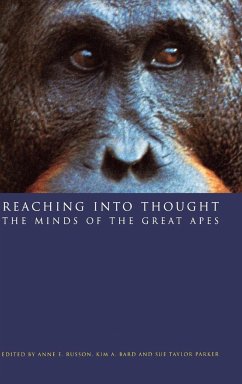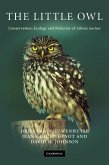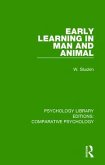What special qualities of mind set the great apes apart from other nonhuman primates, and indeed from ourselves? In this book, field and laboratory researchers show that the great apes have high level abilities in both social and ecological domains, including tool use, pretense, self-awareness, deception, consolation, teaching and culture itself. Great apes are also shown to be capable of thinking at symbolic levels, traditionally considered to be uniquely human. Here, the mechanisms involved in building these abilities - especially the lengthy developmental and 'enculturation' processes - are emphasized, showing how new discoveries are changing views on how primates and human intelligence evolved. This book is for anyone interested in current research and theoretical views of great ape cognition.
Table of contents:
1. Exploring the minds of the great apes: Issues and controversies Anne E. Russon and Kim A. Bard; Part I. The Scope of Great Ape Intelligence: 2. Chimpanzees and capuchin monkeys: Comparative cognition James R. Anderson; 3. Acting and understanding: tool use revisited through the minds of capuchin monkeys Elisabetta Visalberghi and Luca Limongelli; 4. Consolation, reconciliation, and a possible cognitive difference between macaques and chimpanzees Frans B.M. de Waal and Filippo Aureli; 5. The misunderstood ape: Cognitive skills of the gorilla Richard W. Byrne; 6. Ostensive behavior in great apes: the role of eye contact Juan Carlos Gomez; 7. Imitation in everyday use: matching and rehearsal in the spontaneous imitation of rehabilitant orangutans Anne E. Russon; 8. 'More is less': the elicitation of rule-governed resource distribution in chimpanzees Sarah T. Boysen; 9. Tool-using behavior in wild Pan paniscus: Social and ecological considerations Ellen J. Ingmanson; 10. Comparison of chimpanzee material culture between Bossou and Nimba, West Africa Tetsuro Matsuzawa and Gen Yamakoshi; Part II. Organization of Great Ape Intelligence: Development, Culture and Evolution: 11. Influences on development in infant chimpanzees: Enculturation, temperament and cognition Kim A. Bard and Kathryn H. Gardner; 12. Heterochrony and the evolution of primate cognitive development Jonas Langer; 13. Simon says: The development of imitation in an enculturated orangutan H. Lyn Miles, Robert W. Mitchell and Stephen E. Harper; 14. Imitation, pretense, and mindreading: secondary representation in comparative primatology and developmental psychology? Andrew Whiten; 15. Self-awareness and self-knowledge in humans, apes and monkeys Daniel Hart and Mary Pat Karmel; 16. Apprenticeship in tool-mediated extractive foraging: the origins of imitation, teaching and self-awareness in great apes Sue Taylor Parker; 17. The effect of humans on the cognitive development of apes Josep Call and Michael Tomasello; 18. Three approaches for assessing chimpanzee culture Christophe Boesch; 19. On the wild side of culture and cognition in the great apes Sue Taylor Parker and Anne E. Russon; Index.
Investigates current field and theoretical information on great ape cognition.
Hinweis: Dieser Artikel kann nur an eine deutsche Lieferadresse ausgeliefert werden.
Table of contents:
1. Exploring the minds of the great apes: Issues and controversies Anne E. Russon and Kim A. Bard; Part I. The Scope of Great Ape Intelligence: 2. Chimpanzees and capuchin monkeys: Comparative cognition James R. Anderson; 3. Acting and understanding: tool use revisited through the minds of capuchin monkeys Elisabetta Visalberghi and Luca Limongelli; 4. Consolation, reconciliation, and a possible cognitive difference between macaques and chimpanzees Frans B.M. de Waal and Filippo Aureli; 5. The misunderstood ape: Cognitive skills of the gorilla Richard W. Byrne; 6. Ostensive behavior in great apes: the role of eye contact Juan Carlos Gomez; 7. Imitation in everyday use: matching and rehearsal in the spontaneous imitation of rehabilitant orangutans Anne E. Russon; 8. 'More is less': the elicitation of rule-governed resource distribution in chimpanzees Sarah T. Boysen; 9. Tool-using behavior in wild Pan paniscus: Social and ecological considerations Ellen J. Ingmanson; 10. Comparison of chimpanzee material culture between Bossou and Nimba, West Africa Tetsuro Matsuzawa and Gen Yamakoshi; Part II. Organization of Great Ape Intelligence: Development, Culture and Evolution: 11. Influences on development in infant chimpanzees: Enculturation, temperament and cognition Kim A. Bard and Kathryn H. Gardner; 12. Heterochrony and the evolution of primate cognitive development Jonas Langer; 13. Simon says: The development of imitation in an enculturated orangutan H. Lyn Miles, Robert W. Mitchell and Stephen E. Harper; 14. Imitation, pretense, and mindreading: secondary representation in comparative primatology and developmental psychology? Andrew Whiten; 15. Self-awareness and self-knowledge in humans, apes and monkeys Daniel Hart and Mary Pat Karmel; 16. Apprenticeship in tool-mediated extractive foraging: the origins of imitation, teaching and self-awareness in great apes Sue Taylor Parker; 17. The effect of humans on the cognitive development of apes Josep Call and Michael Tomasello; 18. Three approaches for assessing chimpanzee culture Christophe Boesch; 19. On the wild side of culture and cognition in the great apes Sue Taylor Parker and Anne E. Russon; Index.
Investigates current field and theoretical information on great ape cognition.
Hinweis: Dieser Artikel kann nur an eine deutsche Lieferadresse ausgeliefert werden.








